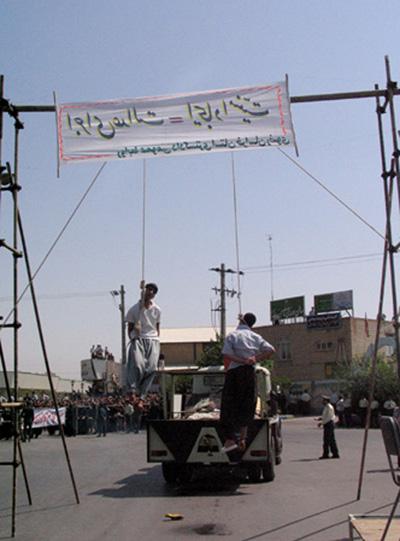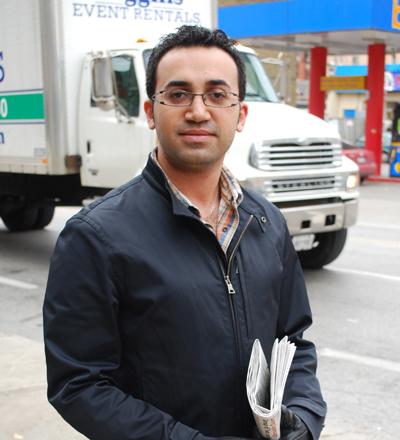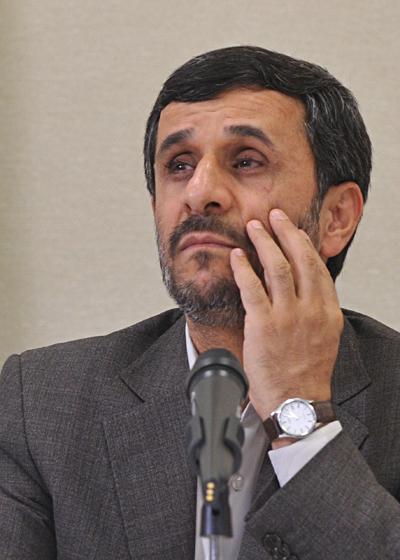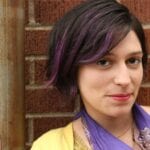
Two Iranian gay teens, 17 and 18, were executed by hanging in the Iranian city of Mashad in July of 2008. Credit: Iranian Student News Agency

Iranian Railroad for Queer Refugees executive director Arsham Parsi helped Amir and Ahmad flee Iran for Canada. Credit: Matt Mills
Some degree of safety is something most gay people in Canada take for granted every day. For Amir and Ahmad, however, it’s a recently acquired gift. After facing death threats from family members because of their sexuality, in a country where homosexuality can be a capital crime, the couple fled Iran to find safety in Toronto’s gay village earlier this spring.
Their journey was anything but easy. It started when the two bloggers met while Ahmad was completing his military service in Amir’s hometown. The two realized they were both part of Iran’s queer blogging scene and quickly became friends, then fell in love.
“I was in a relationship with [Ahmad], and my mother noticed that our relationship was not like a normal friendship,” says Amir. “It meant something, but she did not know exactly what… In the last year that I was in Iran, my family tried to force me to get married to a girl. One day, my mom went to a girl’s place and talked to her parents and arranged everything. She gave me two options: either this girl or that girl, just choose and we will finish everything.”
Amir and Ahmad decided to move to Karaj, a larger city a few hours outside of the capital, Tehran, but Amir says Ahmad’s family “started calling us… and they used all sorts of bad words and told me, ‘You are the responsible person and we want him back.’”
Boxed in by threats to his boyfriend and under pressure because of his family’s influence on a corrupt local government, Ahmad became afraid. “If we told anyone that we are gay and living in the same place, it was very difficult and scary for us.”
The men agreed that they needed to flee Iran entirely, but Ahmad’s family lured him home and took away his passport. The two were separated. Eventually Amir reserved two plane tickets out of Iran, to Turkey, and bought his lover a bus ticket through a friend. Amir told Ahmad that if he got to Tehran, they would be able to escape. Ahmad finally managed to get back his passport, and the pieces of their plan began to come together.
“We thought maybe if we bought a ticket to Tehran directly, [his family will follow him] and find him on his way,” Amir says, so Ahmad took a more roundabout route via Kermanshah, a few hours away, and entered Tehran from there.
“When we were in Turkey, we found out that we were so smart, because we found out that they followed him to find him along Tehran’s highway, but they couldn’t find him,” Amir says, with a bit of a smile.
The pair finally entered Turkey. There, they had a support network of other gay people, including Arsham Parsi, the executive director of Iranian Railroad for Queer Refugees (IRQR), who would later help with their Canadian refugee application process. But still, Turkey felt far from safe.
“It was maybe in the first month that we held each other’s hands, and we were witness to a lot of bad reactions,” Amir says. “They called us ‘faggot’ in Turkish. It was very bad – we decided not to do it again.”
Homophobic remarks were the least of their worries. Ahmad’s mother claimed to be passing through Turkey on a religious trip, and Ahmad was convinced to go alone to visit her, in Istanbul. When asked why he would put himself at risk again, he explains, “We had some financial difficulties.” And in a culture that values filial ties deeply, Ahmad says he felt that forgiving his family was important.
But instead of his mother, Ahmad was greeted by his father and younger brother. They threatened Amir’s life, siezed his passport and demanded that Ahmad return home with them. He cooperated without a fight.
Amir waited in Turkey. One day, when Ahmad’s family thought he was tutoring a friend, he sneaked into his father’s safe and stole back his passport. “In about 10 seconds I ran in and used the key and took my passport and put it in my sock,” he says. But his family noticed that the passport was missing soon after.
“I pretended that I’m so angry, that ‘You lost my passport! It’s your fault!’” Ahmad says, laughing. “Sometimes when my father wants to hide something he puts it where he doesn’t remember where it is.” Ahmad continued to feign indignation. “I told them, ‘Right now you think maybe I took the passport. Well check me out,’ and I opened all of my pockets, but I don’t have the passport there,” he says. “I told them, I’m going to go to my friend’s to teach math, and you better try your best to find it.”
It was the last time he saw his family before his escape. “It was very difficult… I had to not show the face that I really had, that it’s the last time I’m meeting them in person.”
Ahmad finally reunited with Amir in Turkey. After three months of waiting for their refugee claim to be processed, they moved together to Canada.
Ahmad says arriving in Canada was a huge relief. After years of turmoil, he says, he has “a peaceful life here. I’m relaxed and I have nothing to worry about. We don’t need to hide anything and we can hold our hands and walk in the street.”
Contrary to popular sentiment about “queue-jumping” refugees looking for economic opportunities, these gentlemen gave up much of their financial status to live in safety. Amir explains that his choice to flee Iran was not in their economic interest. “My father could do everything for us,” he says. “He agreed to buy a car for me, to buy a house for me, to [get me a job] in the governmental office… just to obey his wishes. But I didn’t need those financial services… I wanted to be who I am.”


 Why you can trust Xtra
Why you can trust Xtra


